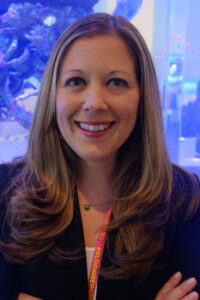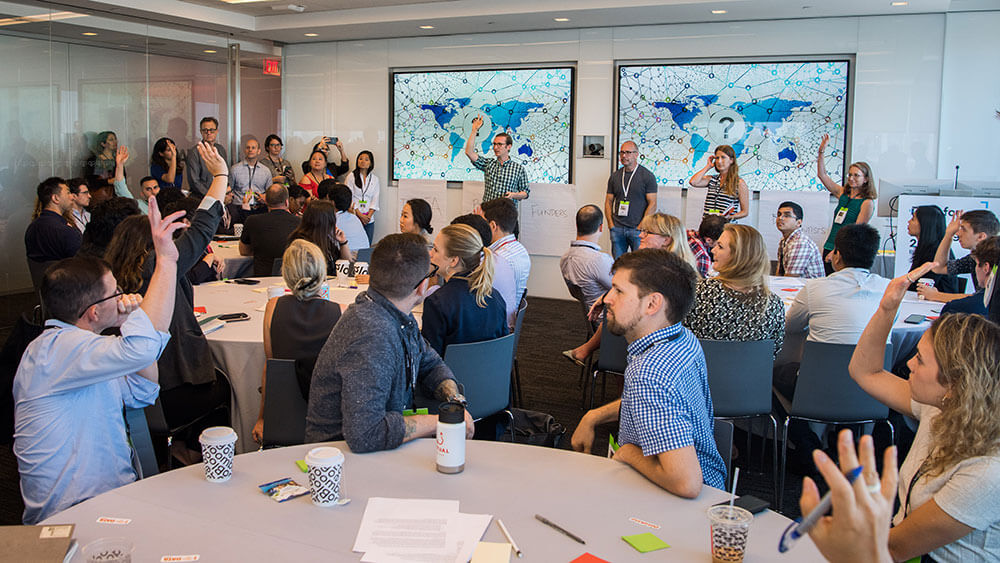
More than 500 people attended the Data for Good Exchange 2018 on Sept. 16 at Bloomberg’s Global Headquarters in New York City. (D4GX photo)|Workshops at the Sept. 16 Data for Good Exchange 2018 in New York City tackled real-world problems. (D4GX photo)
Years ago, when they decided to launch a conference focused on data, the team at global information and tech company Bloomberg wanted to do more than focus on how data can improve operating efficiencies and boost revenues. They wanted to explore how data science methods and modern machine learning can be applied to solve humanitarian issues around poverty, health, human rights, education, and the environment.
Introduced in 2014 as part of the 20th ACM SIGKDD Conference on Knowledge Discovery and Data Mining in New York City and expanded to a standalone event the following year, the Data for Good Exchange has doubled its attendance in just five years. And for this year’s Sept. 16 meeting in Bloomberg’s New York City headquarters, even more people wanted to attend but couldn’t: Registration filled to the event’s 1,000-attendee cap just three days after opening.
From the beginning, “we felt that [this meeting] really filled a void,” said Victoria Cerullo, conference lead for the 2018 D4GX, shorthand for the Data for Good Exchange. Before Bloomberg created the Data for Good Exchange, she said, “there really wasn’t a forum for data for good to be discussed to the extent that it is at our conference.” Bloomberg’s Data for Good Exchange website page describes its mission this way: “The forum enables participants to build cross-sector relationships while solving problems for the social good that might not otherwise be addressed by market forces.”
This year, the single-day event tackled issues ranging from gender equality and climate change to human genetics and the U.S. census — all through the lens of data science. Its audience included researchers, academics, nonprofit leaders, policymakers, and data scientists who come mostly from the U.S., but also flew in from South America, Europe, and Asia. Some attendees work with data every day. Others “know that data is important,” Cerullo said, “and just want to understand how it can help them.”

Victoria Cerullo
Putting Feedback Data Into Practice
The Data for Good Exchange is still a relatively young conference, so organizers continue to tweak, refine — and sometimes significantly expand — its programming each year to better serve their diverse audience. Up until this year, the event was split between panel discussions and paper presentations. But for 2018, the meeting introduced a third track that sprang directly from post-event survey data.
“Attendees said there was great content, great information, but — particularly the data scientists — said they really wanted to roll up their sleeves and do something concrete,” Cerullo said. As a result, this year’s program included a handful of workshops, which were designed to spark discussions and help attendees develop fresh ideas for tackling major challenges.
The four workshops focused on data in varied sectors. One group discussed how governments can find and detect bias in their data-driven initiatives; another, how media can help increase census-response rates. A third workshop talked about encouraging collaboration across sectors in the “data for good movement.” The fourth focused on using data to help communities in need.
“We could only have about 50 people in each workshop, but there was so much demand for them, there were lines out the door,” Cerullo said. “That told us that this is something our attendees are really interested in and engaged in.”
It also led to another idea: Since relatively few attendees could attend each workshop, the conference offered an end-of-day “workshop takeaways” panel, which allowed everyone to hear what the workshop participants had discussed.
Student Power
Cerullo said that graduate students are a significant part of D4GX, and their work takes center stage in one of her personal favorite conference elements, the immersion program. Via a partnership with NYC Media Lab — a consortium of New York City–based universities and the city’s economic development corporation — the program offers a stipend to several doctoral students who study data science or statistics and sends them off to help nonprofits solve real-life data challenges. Then the students appear on a panel at the conference — alongside representatives from the nonprofits they assisted — to discuss those challenges and how they approached them.
This year, one pair of students helped a nonprofit in the Virgin Islands with its post-Hurricane Maria population survey. Another student worked with the Billion Oyster Project, which aims to restore the oyster population around New York Harbor, and a third helped the city of Milan better manage its data.
“Students have always told me that they really value this because they’re typically sitting in front of screens, looking at lots of data on their day-to-day spreadsheets,” Cerullo said. “To be able to connect that with something on the ground is just so valuable.”
Looking back at the full slate of programming from this year’s D4GX, Cerullo said the “broad theme of equity — and its multiple definitions — came up in many different conversations and contexts.” Those included equity of representation in data that determines resource allocation from the government and other sectors, such as how to ensure that all populations are reported in the 2020 U.S. census. “Or, if data collectors working in disaster recovery are unaware that some regions don’t use deeds, but rather property is passed down from generation to generation with no formal records,” Cerullo said, “how can those affected be meaningfully served and provide insights for future models?”
Another conversation about equity and data had to do with gender parity: As more companies disclose board makeup, what is the financial impact of not having women in the boardroom? And finally, she said, the topic of accessibility and relevance was discussed, in terms of including people who were not necessarily in the room at D4GX. “Not everyone,” Cerullo said, “needs to be a data scientist to use, interpret, and feel the impact of data.”

Workshops at the Sept. 16 Data for Good Exchange 2018 in New York City tackled real-world problems. (D4GX photo)
A Bigger Reach
With interest in the Data for Good Exchange continuing to grow each year, Bloomberg’s Victoria Cerullo said that the company is considering moving the event to a larger venue in 2019. She also emphasized that Bloomberg doesn’t make money from the meeting — allowing organizers to stay focused on their original mission for it.
“We think it’s great to convene all these people because from a Bloomberg perspective, philanthropy is extremely important,” she added. “We just want to provide this venue for collaboration. I think it’s a very Bloomberg thing.”
Contributing editor Molly Petrilla is a New Jersey–based freelance writer.
Related
- To learn more about Data for Good Exchange 2018, visit Bloomberg’s Data for Good Exchange site.
- For takeaways from the event about equity and data, visit Tech at Bloomberg.
